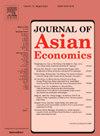绿色治理:环境审计对中国城市碳排放的影响
IF 3.4
3区 经济学
Q1 ECONOMICS
引用次数: 0
摘要
该研究手工收集了国家审计署提供的市级环境审计(EA)数据,以考察EA如何影响低碳发展的进程。利用2008年至2021年281个地级市的面板数据,系统地考察了经济环境与碳排放之间的关系。研究结果表明,电子商务有助于减少城市碳排放,主要是通过促进绿色技术进步和降低能源消耗。此外,从微观和宏观两个层面验证了调节效应:公众环保意识的增强和产业结构的优化增强了EA的碳减排效果。异质性分析表明,在财政投入较大、非传统产业基础、市场化程度较高和数字经济水平较高的城市,EA的碳减排效果更为显著。本研究不仅丰富了碳排放的相关文献,而且为政府环境评估在推动中国低碳转型和实现双碳目标中的作用提供了有力的经验证据和政策建议。研究结论对政策制定者优化生态环境政策、促进中国经济向可持续低碳发展方向转变具有重要的理论和实践意义。本文章由计算机程序翻译,如有差异,请以英文原文为准。
Green governance: The impact of environmental auditing on carbon emissions in Chinese cities
The study manually compiled city-level environmental auditing (EA) data from the National Audit Office to examine how EA influences the advancement of low-carbon development. Using panel data from 281 prefecture-level cities over the period 2008–2021, the research systematically investigates the relationship between EA and carbon emissions. The findings reveal that EA helps reduce urban carbon emissions, primarily by fostering green technological progress and lowering energy consumption. Furthermore, the study validates moderating effects from both micro- and macro-level perspectives: increased public environmental awareness and optimized industrial structure enhance the carbon reduction impact of EA. Heterogeneity analysis indicates that the carbon mitigation effect of EA is more pronounced in cities with greater fiscal investment, non-traditional industrial bases, higher degrees of marketization, and more advanced digital economies. This research not only enriches the literature on carbon emissions but also provides robust empirical evidence and policy recommendations regarding the role of government EA in driving low-carbon transitions and achieving China’s dual carbon goals. The conclusions provide essential guidance for policymakers to optimize EA policies and facilitate China’s economic shift toward sustainable, low-carbon development, which has important theoretical and practical implications.
求助全文
通过发布文献求助,成功后即可免费获取论文全文。
去求助
来源期刊

Journal of Asian Economics
ECONOMICS-
CiteScore
4.70
自引率
9.40%
发文量
90
期刊介绍:
The Journal of Asian Economics provides a forum for publication of increasingly growing research in Asian economic studies and a unique forum for continental Asian economic studies with focus on (i) special studies in adaptive innovation paradigms in Asian economic regimes, (ii) studies relative to unique dimensions of Asian economic development paradigm, as they are investigated by researchers, (iii) comparative studies of development paradigms in other developing continents, Latin America and Africa, (iv) the emerging new pattern of comparative advantages between Asian countries and the United States and North America.
 求助内容:
求助内容: 应助结果提醒方式:
应助结果提醒方式:


